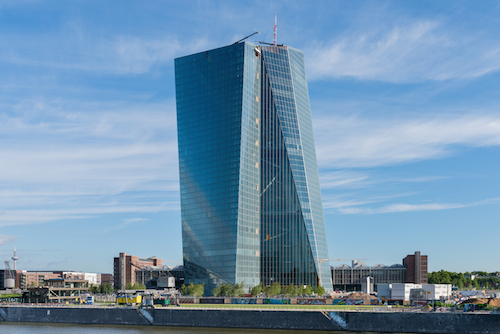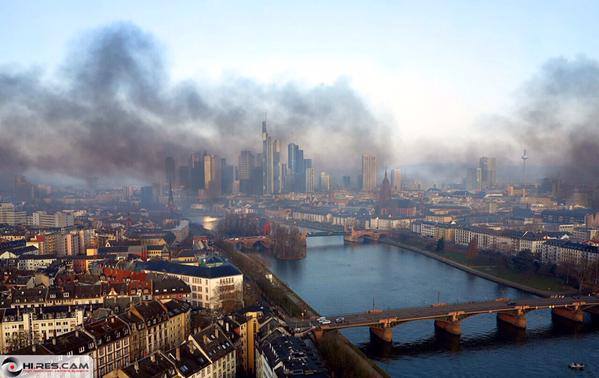Demonstrators dressed as clowns pass by a burning police car in Frankfurt, Germany. Photo: Michael Probst
Blockupy protesters crash ECB housewarming party
- March 19, 2015
Capitalism & Crisis
Thousands converged upon Frankfurt to block the celebration of power and take the resistance to austerity into the heart of the European crisis regime.
- Author
On Wednesday, the European Central Bank celebrated the official opening of its new headquarters in Frankfurt. To mark the occasion, more than ten thousand protesters — united under the Blockupy banner — converged upon Europe’s financial capital from all corners of the continent. Organizers declared that they intended to “take over the party and turn it into an articulation of transnational resistance against European crisis policies and their catastrophic consequences, especially for the people in the European south.”
The German state, in turn, mobilized one of the country’s largest-ever police forces to protect the ECB and make the constitutional act of public protest next to impossible. As in previous years, Frankfurt was on lock-down — and it is not difficult to understand why: EU authorities have long been adamant on insulating the central bankers from any form of popular pressure whatsoever. The ECB, after all, is supposed to answer to the markets, not to the people. Just consider the career trajectory of its president, Mario Draghi, who used to be a managing director at Goldman Sachs: it does not take a trained political economist to figure out where his allegiances really lie.
The Blockupy organizers could not have chosen a more appropriate date for this year’s demonstration. The launch of the ECB’s new headquarters symbolizes practically everything that’s wrong with the European project today. As the Eurozone fell into its never-ending crisis in 2008 and the ECB — as a member of the Troika — imposed life-wrecking austerity measures from Athens to Dublin, an ostentatious 185 meter tall glass and steel skyscraper quietly arose along the river Main. Surrounded by a large fence and castle moat, activists point out how the “intimidating architecture of power is a perfect symbol of the distance between the political and financial elites and the people.”
At an estimated cost of 1.4 billion euros, the searing twin towers — appropriately designed in the postmodern architectural style of deconstructivism — now stand tall as a shining beacon of the new Europe: impersonal, unaccountable and thoroughly anti-democratic. From these commanding heights of monetary and financial control, the ECB has already deposed several elected governments, imposed disastrous reforms and austerity measures, and proposed to pump a mind-boggling 1 trillion euros into the Eurozone’s morally bankrupt financial sector. In the meantime, it is squeezing the Greek government to neutralize the leftist challenge emanating from Athens.
Many EU scholars still tend to euphemistically refer to this technocratic detachment as a sign of the EU’s “democratic deficit.” They will point at the ECB’s lack of “input legitimacy” and argue for greater parliamentary control over its governing board. What such scholars often fail to observe, however, is that the ECB’s democratic deficit has been inscribed into its very role and mandate. As a central bank without a state, the ECB is anti-democratic not by fault but by design. Its much-vaunted “independence” from national governments is in reality a cover for its deliberate insulation from popular pressures and its structural interdependence with private financial interests.
Needless to say, the onset of the crisis has only led to a further escalation of the ECB’s political interference. To give just one example: a number of letters have recently surfaced revealing the full extent of the blackmail deployed by Draghi’s predecessor, Jean-Claude Trichet, at the height of the crisis in 2011-’12. In his communications with the governments of Ireland, Greece, Spain and Italy, the then-president explicitly threatened to cut off emergency credit lines if the governments in question refused to abide by a set of deeply unpopular market reforms and austerity measures that had been drafted up, word for word, by unelected bureaucrats in Brussels and Frankfurt.
This outright blackmail was but the tip of the iceberg. While some people may have heard of Trichet’s letters in the news, few are likely to know about the ECB’s more arcane policies, like the securities markets program (SMP) or long-term refinancing operations (LTRO) through which the ECB effectively bailed out Greece’s private creditors by socializing the country’s debt. Likewise, some may have read about the ECB’s decision to embark upon quantitative easing (QE), but few are likely to understand what this means in practice: namely that the central bank will now start subsidizing private banks to the tune of 60bn euros per month even as millions of Europeans languish in poverty and unemployment.
The fact that there is no widespread public outcry over such blatantly anti-social moves just goes to show to what extent the architects of the Eurozone have succeeded in de-politicizing monetary policy, insulating ECB technocrats from open criticism and allowing them to systematically favor the interests of private investors without ever having to face meaningful opposition. The ECB itself actively cultivates this apolitical image. Two weeks ago, Mario Draghi — just moments after threatening to cut off Greece’s credit if the country’s government fails to comply with the ECB’s bailout conditions — straight-facedly declared that “the ECB is a rule-based institution, not a political one.”
Of course it was a blatant lie. Central banks are profoundly political institutions. For one, they can create money out of thin air — which is precisely what the ECB is doing right now with its expanded assets purchase program. If you can create money, you get to decide how to spend it. And once you start creating 60 billion euros per month, such decisions obviously have redistributive consequences. One option would have been for the ECB to simply transfer bundles of cash to ordinary European citizens in order to counter the social consequences of the crisis and stimulate aggregate demand. Instead, the ECB is using its money-creating powers to buy up toxic assets from private banks and lend the same money back to them at ultra-low interest rates.
According to the official narrative, this monetary stimulus is supposed to re-start private lending and bring about a lasting recovery. But the reality is that very little of this money will ever find its way to ordinary people. As long as growth remains elusive, private banks will be fearful of investing in productive activities and will be much more inclined to divert their capital into the same type of speculative high-risk/high-return investments that caused the crisis to begin with. Unsurprisingly, this is precisely what has happened in the US and the UK. Why else would US stock markets and the London property market be at such record highs in the midst of a protracted economic slump?
From the looks of it, the world is already witnessing the inflation of yet another series of massively destabilizing and potentially catastrophic asset bubbles, this time fueled directly by central bank intervention. The ECB’s decision to pile in on this dangerous game of quantitative easing, and to do so in such extremely anti-social fashion (maintaining the austerity thumbscrews on the periphery while at the same time refusing to ever consider public debt cancellation or progressive fiscal transfers) reveals the deeply politicized character not only of the ECB but of the EU’s neoliberal project more generally. And this is precisely why Blockupy is such an important initiative.
Not only do the demonstrations in Frankfurt serve to re-politicize the ECB and its monetary policy; they are also laying the groundwork for the emergence of a transnational movement against the rule of finance, bringing the resistance to austerity right into the heart of the European crisis regime. Blockupy shows that this is no longer just about a debtors’ rebellion in the periphery. When the bankers looked down from their towering edifice on Wednesday, they saw plumes of smoke rising across the skyline. This is not irrelevant. By forcing the ECB governing council to significantly scale back its housewarming party, the protesters have successfully disturbed the celebration of power. Now the great challenge that lies ahead is to actually start disturbing its exercise.
Source URL — https://roarmag.org/essays/blockupy-frankfurt-ecb-democracy/



